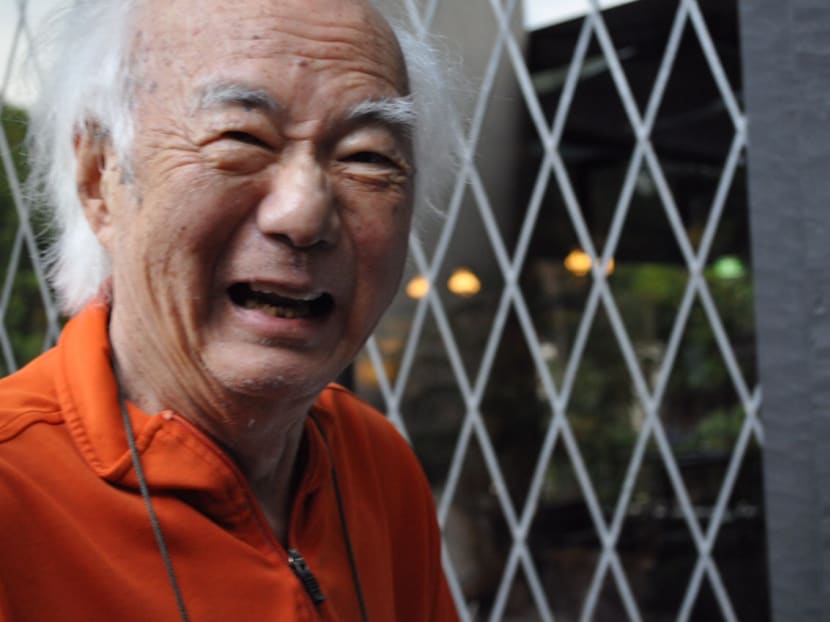Building a sustainable city requires art, conservation and even urban farming, says architect William Lim
SINGAPORE — For William Lim Siew Wai — the renowned Singapore architect behind many iconic buildings here, such as Golden Mile Complex and People’s Park Complex — building sustainable cities involves going beyond planning and buildings. In fact, it should encapsulate art, conservation and even urban farming.

William S. W. Lim is the renowned Singapore architect behind iconic landmarks such as People's Park Complex and and Golden Mile Complex. Photo: NTU CCA/Lena Lim
SINGAPORE — For William Lim Siew Wai — the renowned Singapore architect behind many iconic buildings here, such as Golden Mile Complex and People’s Park Complex — building sustainable cities involves going beyond planning and buildings. In fact, it should encapsulate art, conservation and even urban farming.
In an exclusive interview with TODAY, Lim, whose ideas are the focus of an upcoming exhibition at the NTU Centre for Contemporary Art Singapore, said: “By the end of the 20th century, leading architectural critics announced that the star architect is dead and no longer relevant ... some of (the star architects) even made a fool of themselves.”
“Architecture began to move towards a more social-orientated way of doing things, the role of the architect needed to be redefined. Leading architects and planners are joining forces with people from other disciplines to talk about sustainability, to talk about art, to talk about the importance of sustainable development,” he added.
Lim, 84, himself is a leading example of an architect who has redefined the parameters of his field. Other than his building projects, he has written and edited numerous publications, lectured around the world, and participated in various platforms on architecture and urbanism in Asia. To champion issues on urban development and conservation, Lim co-founded non-governmental organisations such as the Singapore Planning Urban and Research Group in 1965 and the Singapore Heritage Society in 1986.
“Architecture and planning are no longer dominant. Social, economic and political structures are important. It (architecture) has to move to sustainability, to conservation, to urban agriculture and so on. This has been talked about every day now, and it is more prominent with the challenge of climate change,” said Lim.
Lim cited the example of people turning to urban farming in places such as China and other developing countries where crops and food are grown in urban areas to save costs and reduce the need for transportation. “These countries are trying this due to necessity, and it shows there are different ways of moving towards sustainable development.”
SHIFTING PRIORITIES
He explained how he himself transitioned from a practising architect to writing and exploring urban living. “In 2002, during my 70th birthday, I announced I was giving up my practice to concentrate my investigations into those subjects. At that point I also felt it was not very important to keep practising architecture. Ideas for urbanism in an economic, political and social sense began to dominate my writing.”
These ideas will be explored further in the exhibition, Incomplete Urbanism: Attempts of Critical Spatial Practice, at the Centre for Contemporary Art Singapore (NTU CCA Singapore).
Borrowing its title from his book, Incomplete Urbanism: A Critical Urban Strategy for Emerging Economies published in 2012, the exhibition is curated by centre director Ute Meta Bauer, along with Khim Ong, deputy director, exhibitions, residencies & public programmes, and Magdalena Magiera, curator, outreach & education.
The exhibition serves as a laboratory of ideas of sorts — with videos, films and even a sensory exploration of scents in different locations in Singapore, and presents various researches into the spatial, cultural, and social aspects of city life.
For Lim, the use of art to explore these ideas is both inevitable and necessary, being a passionate champion of the arts scene. He has made numerous donations to arts groups and causes over the years. For his 80th birthday in 2012, Lim donated an undisclosed six-figure sum to local arts organisations The Necessary Stage, TheatreWorks, Wild Rice, The Substation and The Singapore Art Museum as well as independent artists, playwright Alfian Sa’at and artist Zai Kuning. Besides financial support, Lim and his wife Lena, who founded local mainstay publisher Select Books, have brought together many of Singapore’s artists and cultural producers through informal salons and parties in their home.
Lim truly believes the arts is key to future sustainability. “How do you create a situation where there is a sustainable lifestyle, contentment and growing happiness index, how can that be done and encouraged? The answer lies with the arts community, the arts community has the magic to turn things around, and now, arts communities everywhere are trying to address this challenge.”
People in the arts community, he explained, “tend to go beyond rational thinking and think of the impossible”, instead of using the usual ways to solve problems. For example, he added, “theatre companies Theatreworks, The Necessary Stage and Wild Rice have constantly handled situations in alternative and unconventional ways. It is not as easy when you rely on rational thinking, which comes up with the same format each time.”
Lim will also be delivering a lecture during the Impossibility of Mapping (Urban Asia) conference in November, held in conjunction with the exhibition. Regarding the importance of the continued investigation of ideas on urban living, he reflected: “My understanding is that it (urbanism) is never complete and always changing, and its direction is always unknown.”
Incomplete Urbanism: Attempts of Critical Spatial Practice runs from Oct 29 to Jan 29, 2017 at the NTU Centre for Contemporary Art Singapore, Gillman Barracks.
The Impossibility of Mapping (Urban Asia) conference will be held on Nov 14, 25 and 26 as part of the NTU CCA Ideas Fest 2016/17.





